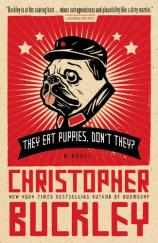They Eat Puppies, Don't They?
Review
They Eat Puppies, Don't They?
Humor is, for me, a bipartisan affair. I enjoy Christopher Buckley’s novels for the same reason I love Jon Stewart’s comedy: They make me laugh. Buckley’s satires are silly and perceptive, a tough narrative feat that few comedic talents --- P.G. Wodehouse, Monty Python --- manage to get right. He’s also had the good fortune to be helped by real-life events. His 2008 novel SUPREME COURTSHIP has a protagonist, a pretty, gun-toting firecracker nominated to the Supreme Court, who bears more than a passing resemblance to Sarah Palin, whom John McCain made famous shortly after the book’s publication. Now Buckley may once again be the beneficiary of good timing, if we can call it that. Activist Chen Guangcheng escaped from house arrest two weeks before the publication of THEY EAT PUPPIES, DON’T THEY?, a work that imagines the U.S. and China on the brink of war.
"The pace is fast, and there are many funny one-liners... [T]his is an enjoyable work. And it’s hard to dislike a novel that features a Navy communications ship called the Rumsfeld."
The Senate Appropriations Committee votes 12-7 to deny funding for Dumbo, a predator drone made by aerospace giant Groepping-Sprunt, despite the massive PR campaign led by lobbyist Walter “Bird” McIntyre. After this defeat, Groepping’s CEO, Chick Devlin, summons Bird to company headquarters in Alabama to discuss a project so secret that Devlin can’t say much more than its code name: Taurus. The target of the project is China, but in order to get funding, Devlin says, the American people need to be terrified of the threat China poses to the US way of life. He asks Bird to start spreading stories that will drum up anti-China sentiment.
At first, Bird is unsure how to go about this. But as he’s having dinner one evening, he sees Angel Templeton on a political affairs program called “Boring In.” Templeton, “tall, blond, buff, leggy, miniskirted,” is the Ann Coulter-like head of a conservative think-tank called the Institute for Continuing Conflict. On the cover of her most recent book, The Case for Preemptive War: Taking the “Re-“ Out of Retaliation, she’s dressed as a patriotic dominatrix and brandishes a riding crop. She has an eight-year-old son whom she named Barry Goldwater Templeton and with whom she shares a Valium each night to help them sleep.
Bird goes to Angel’s office to convince her to join him in spreading anti-Chinese propaganda. She declines until Bird, an aspiring novelist, fabricates details of Taurus by borrowing from the latest volume of his unpublished Armageddon tetralogy. Taurus is about the muon bomb, he says, a weapon that “involves sub-atomic particles.” Angel is intrigued and agrees to assist.
When the Dalai Lama is taken ill during a meeting with the pope, Bird and Angel plant a story in the Indian newspaper The Delhi Beast (Buckley is a columnist for Tina Brown’s Daily Beast). The story: China tried to poison the Dalai Lama. American ire grows, especially after famous actors take up the cause and denounce China’s latest tactics against Tibet. The situation escalates when Fa Mingyao, the nightmare-plagued President of the People’s Republic, learns of this agitprop. When his advisers on China’s Standing Committee suggest that the best way to respond to the bad press their country has received is to actually poison the Dalai Lama, Fa’s nightmares become more frequent, and the tensions between the two countries become so strained that the CIA wonders if it might not be best for the US to kill the Dalai Lama and blame the crime on the Chinese.
Sound convoluted? It is, but that’s Buckley for you. It’s tough to review a work of humor, especially satire. You either like the genre or you don’t. If you’re a Buckley fan, as I am, then you’ll find pleasures in his new work. The pace is fast, and there are many funny one-liners, particularly among the Washington élite and the ambitious sorts who aspire to join them. Some of the humor this time, however, seems old. Unless current events bring about a third Red Scare, this story about a Communist menace may seem to many readers like a novel out of the 1950s. And some of the jokes are borderline offensive. One character refers to Ambassador Ding as Ding-Dong. Terms like chop-chop are used. Perhaps the point was to ridicule archaic modes of thinking, but the terms are still painful to read.
But since when have satirists been reluctant to offend? It comes with the territory. Lapses aside, this is an enjoyable work. And it’s hard to dislike a novel that features a Navy communications ship called the Rumsfeld.
Reviewed by Michael Magras on May 16, 2012





